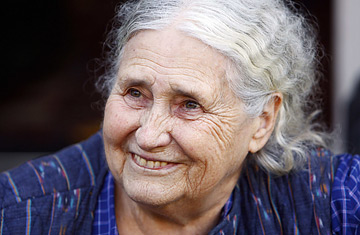
British novelist Doris Lessing
Close watchers of the Nobel Prize for Literature look at the selection process as a kind of geopolitical checkers match, as the Swedish Academy plucks major figures from the national literatures of far-flung countries: China (Gao Xingjian, 2000) Trinidad and Tobago (V.S. Naipaul, 2001), Hungary (Irme Kertesz, 2002), South Africa (J.M. Coetzee, 2003), Austria (Elfriede Jelinek, 2004), England (Harold Pinter, 2005), Turkey (Orhan Pamuk, 2006). By choosing Doris Lessing in 2007 the Academy has scored a triple: she was born in Iran, known then as Persia, in 1919; raised in Zimbabwe, known then as Rhodesia; and lives in the U.K. In its citation, the academy called her "that epicist of the female experience, who with scepticism, fire and visionary power has subjected a divided civilisation to scrutiny." (An epicist, if you're curious, is a person who writes epics.)
Like so many writers' lives, Lessing's has been an improbable one. Her parents were English, and her father sought his fortune as a bank clerk in Persia, then as a bush farmer in Rhodesia, with limited success. Lessing bridled at their strict Edwardian mores and left school at 13 — that was the end of her formal education, although she continued to read voraciously. She left home at 15, moved to England and became associated with the Communist movement. Her writing career began in earnest in 1950 with her first novel, The Grass Is Singing.
Lessing is a genuinely sui generis literary phenomenon, inexhaustible and defiantly unique — her oeuvre runs to over 40 books. Her principal theme is the experience of women in contemporary society, which she addressed most ambitiously, and successfully, in The Golden Notebook, her 12th novel, published in 1962. A formal tour de force, The Golden Notebook is the story of a divorced writer named Anna Wulf told through her four notebooks, each of which is concerned with recording a different aspect of herself. Brilliant, autobiographical and feverishly experimental, it's a bravura portrait of a shattered self, richly adorned with ruthless commentary on psychoanalysis, Communism, England and Africa, and modern fiction. "This novel," Lessing has said of The Golden Notebook, "is an attempt to break a form; to break certain forms of consciousness and go beyond them. While writing it, I found I did not believe some of the things I thought I believed: or rather, that I hold in my mind at the same time beliefs and ideas that are apparently contradictory. Why not? We are, after all, living in the middle of a whirlwind."
Although both feminism and Communism have laid claim to Lessing, she avoids being identified with movements or ideologies, political or literary. She refuses to settle for simple answers or received wisdom, and she has never been afraid to commit heresy. In the 1970s she began experimenting with science fiction — it is unlikely that any other Nobel laureate could lay claim to a work like her 1994 novel The Making of the Representative for Planet 8, about an eco-catastrophe on a distant world. In August Lessing published a new novel, The Cleft, in which she re-imagines the history of the human race — originally, she proposes, humanity consisted entirely of women, all the trouble having begun when women inexplicably began giving birth to male babies. "The best thing one can say of anyone is that they fight," Lessing wrote in The Golden Notebook. Over nine decades, she has done nothing but.
